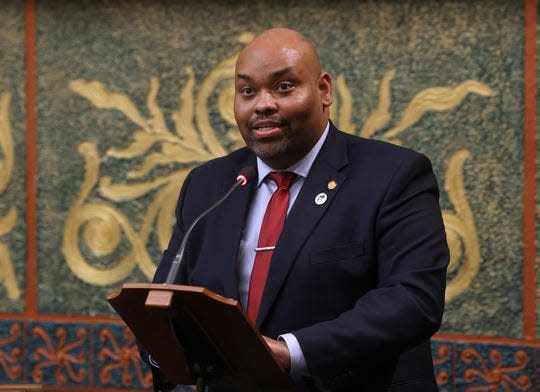Democrats eye overhaul of economic development fund favored by Whitmer
Last year, Michigan Democrats spent big on corporate subsidies. Now, they want to divert hundreds of millions of already-committed corporate income tax revenue away from the state’s major economic development fund.
Gov. Gretchen Whitmer has touted the fund as key to job growth and maintaining Michigan’s competitive edge as the auto industry transitions to electric vehicles.
Before the legislative spring break, Democrats in the state Senate approved legislation to add new criteria for economic development officials to consider before approving taxpayer-funded grants to companies and public support for their work sites. Under the proposal, officials must take into account the wages the publicly subsidized jobs would pay and whether the company recently laid off workers in Michigan, among other factors.
The bills would also move millions currently slated for the Strategic Outreach Attraction and Reserve (SOAR) corporate subsidy fund to make community investments instead, including in regional transit, affordable housing, child care and workforce training. They passed the Senate along party-line votes against GOP opposition.
State Sen. Mallory McMorrow, D-Royal Oak, who sponsored the main bill in the package said she has spent almost every day of the past year focused on retooling Michigan's economic development approach. "It's something that I think is existential for us," she said.
The proposed changes come after some Democratic lawmakers expressed discomfort with the amount of business subsidies they approved for large electric vehicle-related projects favored by Whitmer. But just as some Democrats in the state House celebrated a chance to change course, Whitmer voiced concern.

The governor has indicated she wants to see changes to the legislation before it lands on her desk, specifically to the proposal to shift half of the corporate income tax revenue currently set to go to the SOAR fund into a new community investment fund instead. "That was something that we had not thoroughly discussed, and so I'm confident that as the bills move into the House, we'll be able to have a little more thoughtful dialogue on that front," Whitmer told reporters late last month.
A call to stop 'corporate giveaways'
The proposed community investment fund would put money into some of the same areas recommended by Whitmer's population council, which focused on growing the state. A separate report from Michigan Future Inc. − a research organization focused on reviving the economic prosperity Michigan once enjoyed − shows how much economic ground Michigan has lost in recent decades. It calls on policymakers to reconsider how much public spending they devote to preserving manufacturing jobs and instead consider ways to grow industries that disproportionately employ college-educated workers.
Both reports, McMorrow said, cry out for a shift in Michigan's economic strategy.
One of the nation's leading researchers on the public subsidies offered to businesses has called for investing in programs that target unemployed workers in the community where subsidized jobs would be located. Senior Economic Tim Bartik for the Kalamazoo-based W.E. Upjohn Institute for Employment Research wrote in an email that child care, job training and other investments to remove barriers to work can lower the cost of every subsidized job created compared to just giving companies cash.
McMorrow's bill, along with another from state Sen. Mary Cavanagh, D-Redford Township, would create a new "Michigan 360" fund to make community investments statewide, not just in the places where subsidized jobs would locate as initially proposed. With the legislation now pending in the state House, McMorrow has urged voters to contact their state representatives to ask them to support the proposal "so we can STOP spending big on corporate giveaways and START investing in ourselves," she wrote in a social media post.
Some Democrats in the state House hope to take up the bills. "I'm really excited to see this legislation pass the Senate and come to the House, because I think it really adds a more comprehensive look at economic development, and it's something that could make transformational change in our state," said state Rep. Jason Morgan, D-Ann Arbor.
Republicans attack economic development strategy they previously supported
Republicans have blasted Whitmer's economic development plan and the funding approved by Democratic lawmakers as haphazard. They've criticized Democrats for opposing a permanent income tax cut and repealing Michigan's "right-to-work" law that enabled those in unionized workplaces to opt out of paying union dues and fees.

"We're proposing elements that would actually lead to a coordinated economic growth plan and we welcome the negotiation," said House Minority Leader Matt Hall, R-Richland Township during a March roundtable with reporters.
But a little over two years ago, lawmakers from both parties came together quickly to create a new fund to lure companies to Michigan. They set up SOAR to give cash to companies that create jobs in the state and pay for site preparation such as demolition and environmental remediation after Ford announced plans to build new electric vehicle-related manufacturing facilities outside Michigan. But a rift in the political coalition that supported SOAR emerged after Democrats won control of the state Legislature and faced GOP opposition to Whitmer's economic development projects.

Hall − who was among the Republicans who voted to create SOAR − now criticizes its spending, saying companies awarded support will create low-wage manufacturing jobs when Michigan needs to diversity its economy.
"I never thought it would only be used for basically electric battery plants," Hall said earlier this year when pressed by the Free Press to explain the shift in his position. The state has approved over $1.2 billion in SOAR grants to companies for 13,422 jobs, according to the latest report from the state's economic development agency. Officials have also approved $506.7 million for site prep.
Some of the economic development spending has sparked heated debate among Democratic lawmakers, too, including a planned SOAR-funded Ford battery plant project in Marshall. "It was contentious to say the least," said state Rep. Joey Andrews, D-St. Joseph. He said he's talked to several colleagues who have vowed to oppose similar large taxpayer-funded economic development projects in the future. "But I think a change like this would get a lot of them on board because they see it as a community investment and not putting money directly into corporations' coffers," he said of McMorrow's proposal.
Whitmer Growth Council: Incentives, free education, public transit recommendations for Michigan population growth
Will all Ds support economic development policy shift in House?
"As we're looking at economic development, we want to make sure businesses are taken care of we also want to make sure that people are taken care of us well," said state Rep. Jason Hoskins, D-Southfield, who chairs the state House's Economic Development and Small Business Committee. It's difficult to work in a state where it's hard to commute to a job or there's a dearth of child care, he said.
Without the adjustments to SOAR, he's not sure what the future holds for the program. "It's hard to say," he said. "I think there is a concern about the amount of spending that we have been doing with some of these programs like SOAR."

Only one Democratic lawmaker − state Rep. Dylan Wegela, D-Garden City − voted against tax relief for low-income earners and retirees because the new law included a provision to automatically deposit up to $1.5 billion in corporate income and business tax revenue into SOAR. Wegela has consistently voted against subsidies for businesses, describing the spending as a corporate "handout."

McMorrow said Michigan is not at the point where it can stop offering corporate subsidies altogether. "I think the ultimate goal and I think most people would believe this, is you want to get to a place where you no longer have to rely on incentives for companies to want to come to and invest in your community," she said. "So the way that I think about this is how do we build the ramp to get to that place so that we don't have to pay companies to do business here?"
Wegela said Michigan could end corporate subsidies immediately without triggering an economic fallout. "I think we could stop it tomorrow and that doesn't mean every corporation is going to leave the state," he said. Still, he said "any dollar that doesn't go the SOAR fund in its current form is a good thing because the SOAR fund is clearly not working." He said he doesn't have a firm stance yet on McMorrow's legislation but expressed concerns about what he sees as a loose definition of community investments the proposed "Michigan 360" fund could make and dollars that could flow outside public institutions.
Under the legislation, local economic development corporations, community advocacy groups and other entities along with local governments could receive support. "I think the program would be better any way that we can ensure that all the public funds we can go to public institutions and are used on public projects," Wegela said.
The SOAR overhaul is not the only economic development policy on Democrats' agenda as they return from their spring break. Democrats in the state Senate passed legislation to resurrect and revamp a defunct program to reduce payroll taxes for companies that create Michigan jobs paying above the median regional wage. Lawmakers have also passed legislation to create a research and development tax credit. Whitmer called for both proposals in her State of the State address at the start of the year.
Contact Clara Hendrickson at chendrickson@freepress.com or 313-296-5743. Follow her on X, previously called Twitter, @clarajanehen.
Looking for more on Michigan’s elections this year? Check out our voter guide, subscribe to our elections newsletter and always feel free to share your thoughts in a letter to the editor.
This article originally appeared on Detroit Free Press: Michigan lawmakers look to retool economic development
